Jingfan Chen
MiniRec: Data-Efficient Reinforcement Learning for LLM-based Recommendation
Feb 04, 2026Abstract:The integration of reinforcement learning (RL) into large language models (LLMs) has opened new opportunities for recommender systems by eliciting reasoning and improving user preference modeling. However, RL-based LLM recommendation faces significant efficiency challenges, making full-data training costly. Existing data selection methods define sample value based on learnability or representativeness, yet their loss- or gradient-driven or dataset coverage-driven criteria often misalign with RL learning dynamics, resulting in suboptimal performance. To address this, we propose MiniRec, a data selection framework tailored for RL-based LLM recommendation. MiniRec evaluates sample learnability using key RL signals -- rewards -- pruning samples that are too easy (too high reward) or too difficult (consistently low reward). It assesses representativeness by aligning sample gradients with the approximated "ideal" global RL optimization trajectory, selecting samples that mainly drive model updates, and it also enforces diversity to reduce redundancy. Combined with a curriculum learning strategy from easy to hard samples, MiniRec significantly reduces training cost while largely preserving performance. Extensive experiments demonstrate MiniRec's effectiveness, highlighting the importance of reward-aligned, trajectory-informed data selection in RL-based LLM recommendation.
AutoGUI: Scaling GUI Grounding with Automatic Functionality Annotations from LLMs
Feb 04, 2025



Abstract:User interface understanding with vision-language models has received much attention due to its potential for enabling next-generation software automation. However, existing UI datasets either only provide large-scale context-free element annotations or contextualized functional descriptions for elements at a much smaller scale. In this work, we propose the \methodname{} pipeline for automatically annotating UI elements with detailed functionality descriptions at scale. Specifically, we leverage large language models (LLMs) to infer element functionality by comparing the UI content changes before and after simulated interactions with specific UI elements. To improve annotation quality, we propose LLM-aided rejection and verification, eliminating invalid and incorrect annotations without human labor. We construct an \methodname{}-704k dataset using the proposed pipeline, featuring multi-resolution, multi-device screenshots, diverse data domains, and detailed functionality annotations that have never been provided by previous datasets. Human evaluation shows that the AutoGUI pipeline achieves annotation correctness comparable to trained human annotators. Extensive experimental results show that our \methodname{}-704k dataset remarkably enhances VLM's UI grounding capabilities, exhibits significant scaling effects, and outperforms existing web pre-training data types. We envision AutoGUI as a scalable pipeline for generating massive data to build GUI-oriented VLMs. AutoGUI dataset can be viewed at this anonymous URL: https://autogui-project.github.io/.
DiffusePast: Diffusion-based Generative Replay for Class Incremental Semantic Segmentation
Aug 02, 2023Abstract:The Class Incremental Semantic Segmentation (CISS) extends the traditional segmentation task by incrementally learning newly added classes. Previous work has introduced generative replay, which involves replaying old class samples generated from a pre-trained GAN, to address the issues of catastrophic forgetting and privacy concerns. However, the generated images lack semantic precision and exhibit out-of-distribution characteristics, resulting in inaccurate masks that further degrade the segmentation performance. To tackle these challenges, we propose DiffusePast, a novel framework featuring a diffusion-based generative replay module that generates semantically accurate images with more reliable masks guided by different instructions (e.g., text prompts or edge maps). Specifically, DiffusePast introduces a dual-generator paradigm, which focuses on generating old class images that align with the distribution of downstream datasets while preserving the structure and layout of the original images, enabling more precise masks. To adapt to the novel visual concepts of newly added classes continuously, we incorporate class-wise token embedding when updating the dual-generator. Moreover, we assign adequate pseudo-labels of old classes to the background pixels in the new step images, further mitigating the forgetting of previously learned knowledge. Through comprehensive experiments, our method demonstrates competitive performance across mainstream benchmarks, striking a better balance between the performance of old and novel classes.
Fairly Adaptive Negative Sampling for Recommendations
Feb 16, 2023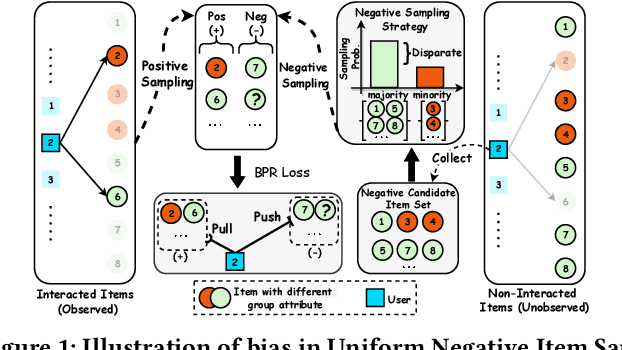
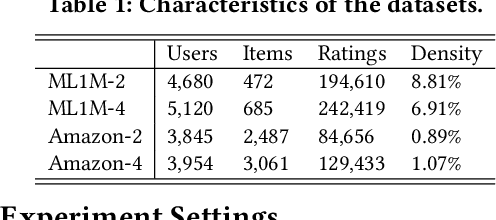
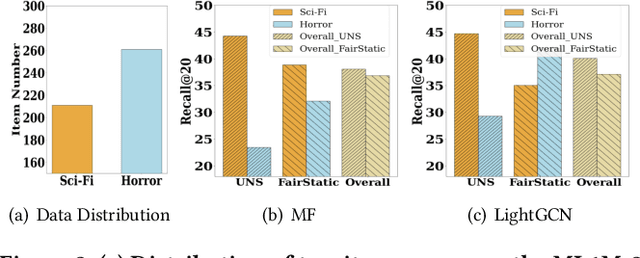
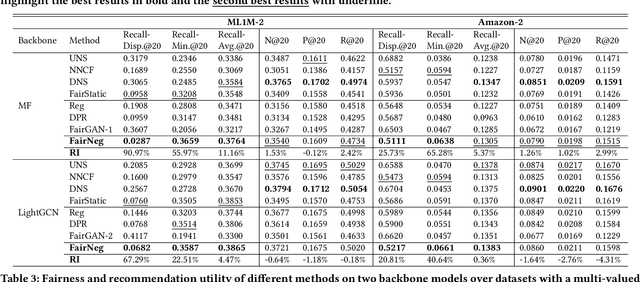
Abstract:Pairwise learning strategies are prevalent for optimizing recommendation models on implicit feedback data, which usually learns user preference by discriminating between positive (i.e., clicked by a user) and negative items (i.e., obtained by negative sampling). However, the size of different item groups (specified by item attribute) is usually unevenly distributed. We empirically find that the commonly used uniform negative sampling strategy for pairwise algorithms (e.g., BPR) can inherit such data bias and oversample the majority item group as negative instances, severely countering group fairness on the item side. In this paper, we propose a Fairly adaptive Negative sampling approach (FairNeg), which improves item group fairness via adaptively adjusting the group-level negative sampling distribution in the training process. In particular, it first perceives the model's unfairness status at each step and then adjusts the group-wise sampling distribution with an adaptive momentum update strategy for better facilitating fairness optimization. Moreover, a negative sampling distribution Mixup mechanism is proposed, which gracefully incorporates existing importance-aware sampling techniques intended for mining informative negative samples, thus allowing for achieving multiple optimization purposes. Extensive experiments on four public datasets show our proposed method's superiority in group fairness enhancement and fairness-utility tradeoff.
Disentangled Contrastive Learning for Social Recommendation
Aug 18, 2022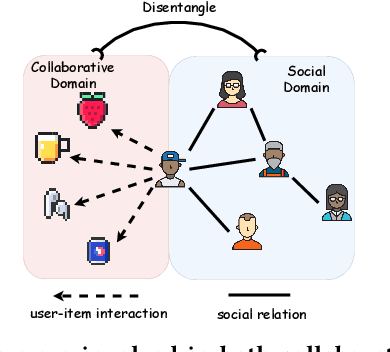
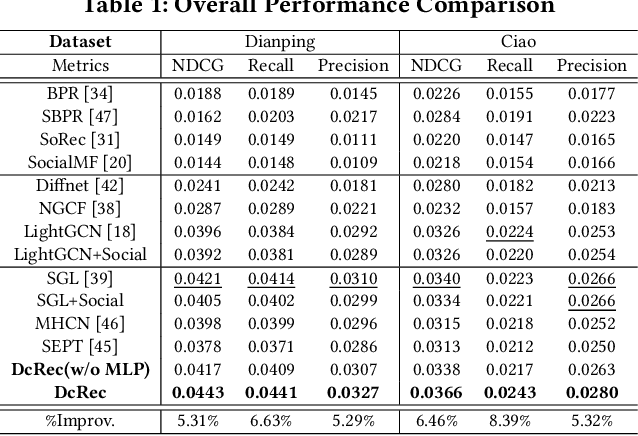
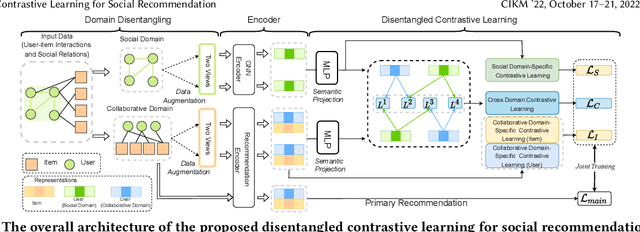

Abstract:Social recommendations utilize social relations to enhance the representation learning for recommendations. Most social recommendation models unify user representations for the user-item interactions (collaborative domain) and social relations (social domain). However, such an approach may fail to model the users heterogeneous behavior patterns in two domains, impairing the expressiveness of user representations. In this work, to address such limitation, we propose a novel Disentangled contrastive learning framework for social Recommendations DcRec. More specifically, we propose to learn disentangled users representations from the item and social domains. Moreover, disentangled contrastive learning is designed to perform knowledge transfer between disentangled users representations for social recommendations. Comprehensive experiments on various real-world datasets demonstrate the superiority of our proposed model.
Knowledge-enhanced Black-box Attacks for Recommendations
Jul 21, 2022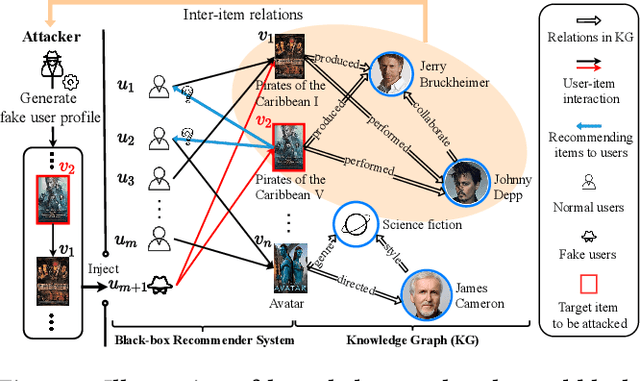
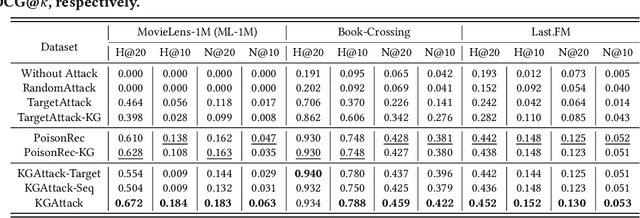
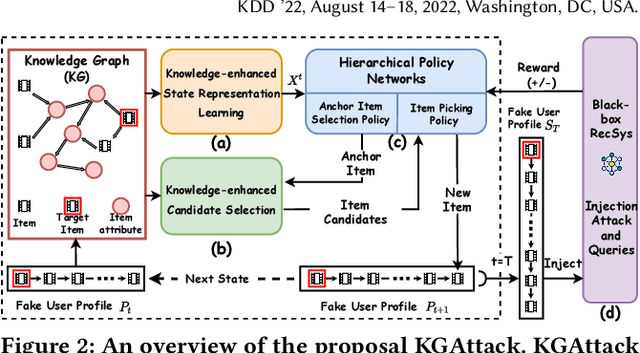
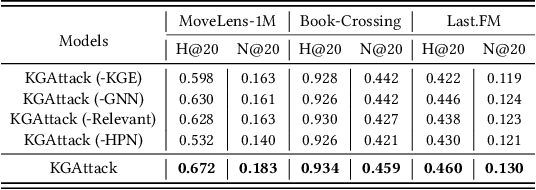
Abstract:Recent studies have shown that deep neural networks-based recommender systems are vulnerable to adversarial attacks, where attackers can inject carefully crafted fake user profiles (i.e., a set of items that fake users have interacted with) into a target recommender system to achieve malicious purposes, such as promote or demote a set of target items. Due to the security and privacy concerns, it is more practical to perform adversarial attacks under the black-box setting, where the architecture/parameters and training data of target systems cannot be easily accessed by attackers. However, generating high-quality fake user profiles under black-box setting is rather challenging with limited resources to target systems. To address this challenge, in this work, we introduce a novel strategy by leveraging items' attribute information (i.e., items' knowledge graph), which can be publicly accessible and provide rich auxiliary knowledge to enhance the generation of fake user profiles. More specifically, we propose a knowledge graph-enhanced black-box attacking framework (KGAttack) to effectively learn attacking policies through deep reinforcement learning techniques, in which knowledge graph is seamlessly integrated into hierarchical policy networks to generate fake user profiles for performing adversarial black-box attacks. Comprehensive experiments on various real-world datasets demonstrate the effectiveness of the proposed attacking framework under the black-box setting.
Transition Relation Aware Self-Attention for Session-based Recommendation
Mar 12, 2022


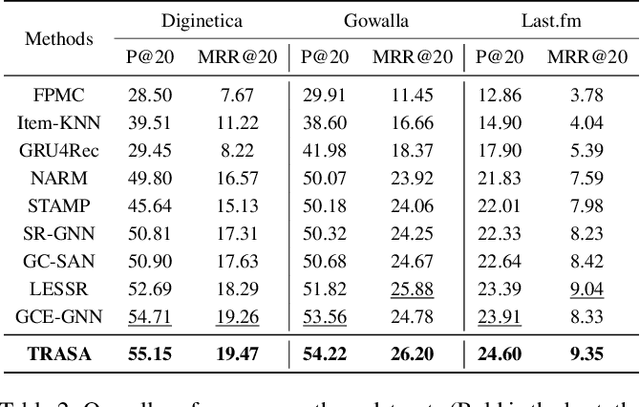
Abstract:Session-based recommendation is a challenging problem in the real-world scenes, e.g., ecommerce, short video platforms, and music platforms, which aims to predict the next click action based on the anonymous session. Recently, graph neural networks (GNNs) have emerged as the state-of-the-art methods for session-based recommendation. However, we find that there exist two limitations in these methods. One is the item transition relations are not fully exploited since the relations are not explicitly modeled. Another is the long-range dependencies between items can not be captured effectively due to the limitation of GNNs. To solve the above problems, we propose a novel approach for session-based recommendation, called Transition Relation Aware Self-Attention (TRASA). Specifically, TRASA first converts the session to a graph and then encodes the shortest path between items through the gated recurrent unit as their transition relation. Then, to capture the long-range dependencies, TRASA utilizes the self-attention mechanism to build the direct connection between any two items without going through intermediate ones. Also, the transition relations are incorporated explicitly when computing the attention scores. Extensive experiments on three real-word datasets demonstrate that TRASA outperforms the existing state-of-the-art methods consistently.
Semi-supervised Embedding Learning for High-dimensional Bayesian Optimization
May 29, 2020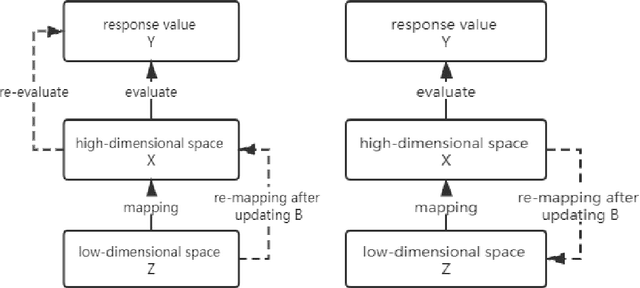
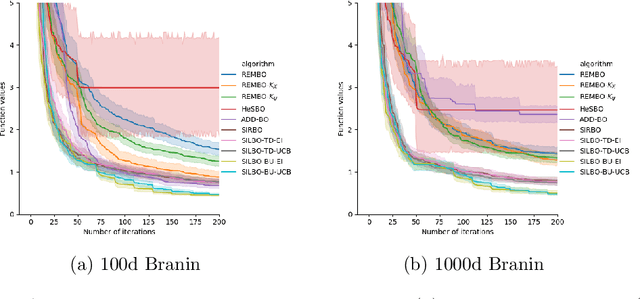
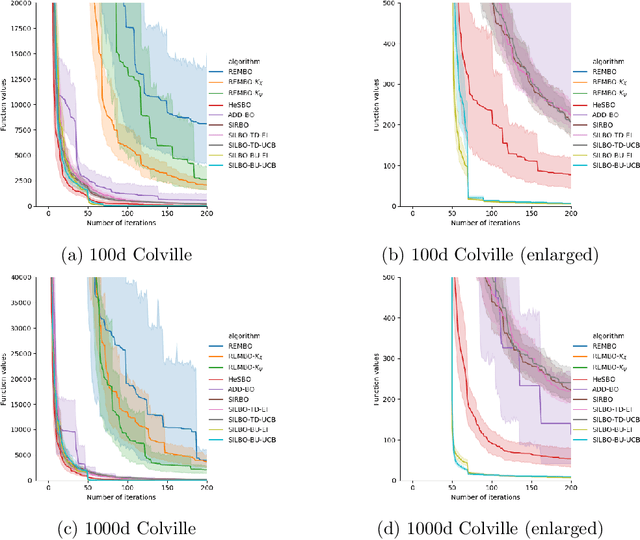
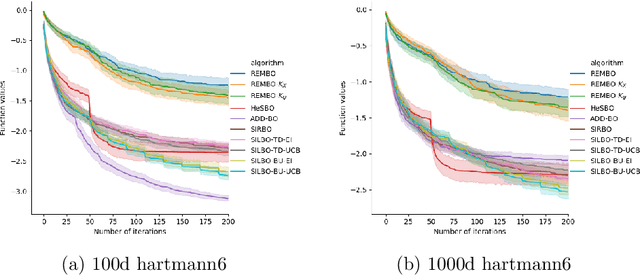
Abstract:Bayesian optimization is a broadly applied methodology to optimize the expensive black-box function. Despite its success, it still faces the challenge from the high-dimensional search space. To alleviate this problem, we propose a novel Bayesian optimization framework (termed SILBO), which finds a low-dimensional space to perform Bayesian optimization iteratively through semi-supervised dimension reduction. SILBO incorporates both labeled points and unlabeled points acquired from the acquisition function to guide the embedding space learning. To accelerate the learning procedure, we present a randomized method for generating the projection matrix. Furthermore, to map from the low-dimensional space to the high-dimensional original space, we propose two mapping strategies: $\text{SILBO}_{FZ}$ and $\text{SILBO}_{FX}$ according to the evaluation overhead of the objective function. Experimental results on both synthetic function and hyperparameter optimization tasks demonstrate that SILBO outperforms the existing state-of-the-art high-dimensional Bayesian optimization methods.
 Add to Chrome
Add to Chrome Add to Firefox
Add to Firefox Add to Edge
Add to Edge